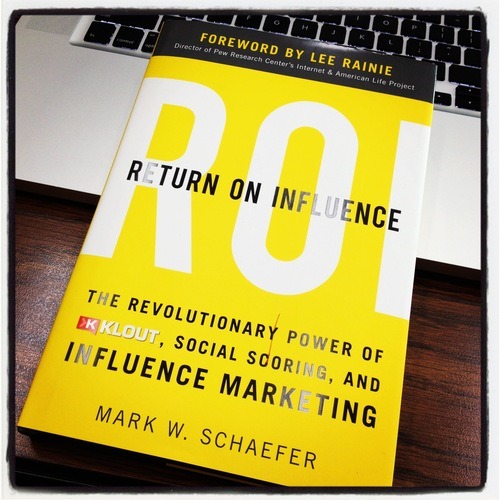
Whether you like it, love it or hate it, whether you agree or disagree with its philosophy or purpose, there’s no denying the fact that Klout and other social influence scoring sites are changing the way we all think about online influence and social media. This is the overarching theme of Mark Schaefer‘s latest book, “Return On Influence – The Revolutionary Power of Klout, Social Scoring, and Influence Marketing”.
There is a simple reason for the meteoric rise of social scoring sites like Klout, Peerindex, and the newest kid on the block, Kred. They promise to keep a running score on something that’s inherently elusive and extremely difficult to measure in any quantifiable way: How likely is it that you will affect behaviour and actions related to a specific topic?
It’s pretty easy to see why this would be valuable information to have. Being able to identify key influencers around specific topics would give businesses and individuals much greater ability to communicate precisely focused messages.
There is of course a great deal of debate around whether such a thing is actually measurable, and whichever side of that argument you fall on I’ll leave you to decide. Ultimately though, the perspective presented in this book will provide insight in to how the algorithms calculate influence scores, the different ways certain actions will affect your score, and how businesses are using these sites to their advantage.
Mark Schaefer does an excellent job in this book by looking at the popularity of Klout, PeerIndex and others as a simple reality of today’s online world. The bottom line is: These sites exist. If trends continue, it’s clear that they aren’t going away anytime soon, so you’d best understand what they do, how they work, and what they can mean for your business.
Schaefer presents both sides of the story through relevant anecdotes and personal experiences. You’ll hear stories of tremendous success along side stories of people gaming the system and being discriminated during job interviews because their scores aren’t high enough. You’ll also hear how social scoring companies like Klout are constantly working towards more effective measurements and minimizing the chance that the system can be gamed.
Social scoring is in its infancy, and as a result it’s sound advice to keep an open mind about it. Given the frequency with which new communication tools have appeared in recent years, I don’t think that anyone can guarantee a prediction about how the business of social scoring is going to play out. But this book gives clarity to some very muddy waters. Overall, Return On Influence is an excellent read, and it will certainly give you pause to rethink your position on influence scoring, regardless of whether your for it or against it.
Find ‘Return On Influence’ on Amazon
Note: This review was not solicited in any way, and my copy of Return On Influence was purchased.
This article originally written for http://crowdshifter.com
